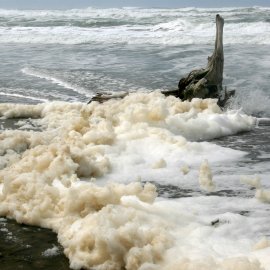Gathering In as the Seasons Change
-
English
-
ListenPause
[intro music]
Welcome to World Ocean Radio…
I’m Peter Neill, Director of the World Ocean Observatory.
My neighbor, Rob McCall, has long created a monthly essay and podcast on the connection between observation and experience of Nature with our inner selves. He is a quiet master of the form, practiced by other modern writers such as Thoreau and Emerson, as well as more contemporary work by Aldo Leopold, Rachael Carson, Annie Dillard, Noel Perrin, Wallace Stegner, Terry Tempest Williams, and many others. It is an evermore-popular literary form, caught between poetry and longer prose, using the power of metaphor to provide a sudden realization, framing some juxtaposition or symbiosis as accessible, revelatory insight.
In his Awanadjo Almanack essay for this moon, Rob described the phenomenon of autumnal “gathering in,” the collection of the last of the harvest, the late planted vegetables, the seeds to over-winter for the spring, the substance that fills root cellars and canning jars to sustain us through the dark of winter. The animals do the same of course, collecting and storing what they need in hidden places and dens to which they retreat from the ice, the cold, and the snow.
It was a lovely thought, and it made me wonder about what would be the correspondent seasonal change in the maritime world, what invisible shifts and sustaining commutations might occur similarly alongshore or below the surface of the ocean?
As the sun moves and the dark descends, surface water becomes colder, declining downwards, colder still, to change patterns of growth and distribution of all elements in the marine food chain – from resultant shifts in lobsters habitat to the rate of phytoplankton growth, from paths of migrating species to more fertile feeding grounds or moving north to south, south to north, feeding and birthing their young, along both coasts of the United States, a regular seasonal pattern invisible to us except for an occasional sighting of a distant spout or diving tail.
At a conference once, I attended a session sponsored by the Government of Brazil, advocating for a membership in the Arctic Council, the international association of nations with direct Arctic interests. I asked what was the rationale for this application? The answer was supported by the evidence of fish migration, from Brazilian waters to the distant north, thousands of miles of passage that was itself a continuity of change, an exemplification of global “gathering in.”
Fishing seasons open and close in connection with such change. Lobster fishing in Maine shuts down just as lobster fishing in Nova Scotia opens up. The scallop season begins here in Maine shortly, hand caught and as fresh as any shellfish can be; I buy them from the fisherman down the road in buckets to freeze in servings that extend well into the coming spring, even early summer. Gathering in.
All this is subtle change, but once recognized it informs a way of being that speaks directly to our health and wellness. Nature shifts and changes throughout the year, differently in every place, but with similar fecundity and substance. As we walk the autumnal fields and observe the changing, falling leaves, we understand that there is a natural order evident, a rotation of goods and services that the farmers know, that the bears and turkeys know, that we don’t know so well, or have forgotten.
We speak here often of the sustenance the ocean provides, not just the food we eat, but also what we feed our souls. Everywhere on earth, we are drawn to the ocean – for this very reason – its dynamic shifts of color and light, the wind and rain and fog and snow, the force of the natural world that is there too for us to harvest – carefully and well – to feed ourselves, literally and socially, to give us strength, and meaning, and hope for the future.
We need to listen more often, more clearly to those poets and writers, to Rob McCall and all my other neighbors here and near who share this ocean community. In a time when the world is fraught with conflict and separation, with argument and scorn, with the decline of civility and civilization, we must pay attention, welcome, and sustain the best of who we are by gathering in.
We will discuss these issues, and more, in future editions of World Ocean Radio.
[outro music]
In this episode of World Ocean Radio host Peter Neill reflects on the coming of winter and the collection of the last of the harvest to sustain us--and Nature's creatures--through the cold and into the spring. And he muses on the correspondent seasonal changes that occur in the maritime world: the shifts in the ocean that vary from the temperature of the water to the distribution of elements in the food chain to the migration of ocean species.
Do you prefer the written word? Head on over to Medium.com/@TheW2O.
About World Ocean Radio
World Ocean Radio is a weekly series of five-minute audio essays available for syndicated use at no cost by college and community radio stations worldwide. Peter Neill, Director of the World Ocean Observatory and host of World Ocean Radio, provides coverage of a broad spectrum of ocean issues from science and education to advocacy and exemplary projects.
Resource from this episode
Rob McCall's Awanadjo Almanack can be read on the Maine Boats Homes and Harbors website and his weekly radio show can be heard on WERU FM. It features his musings on seasonal happenings and the natural world.
- Login to post comments



